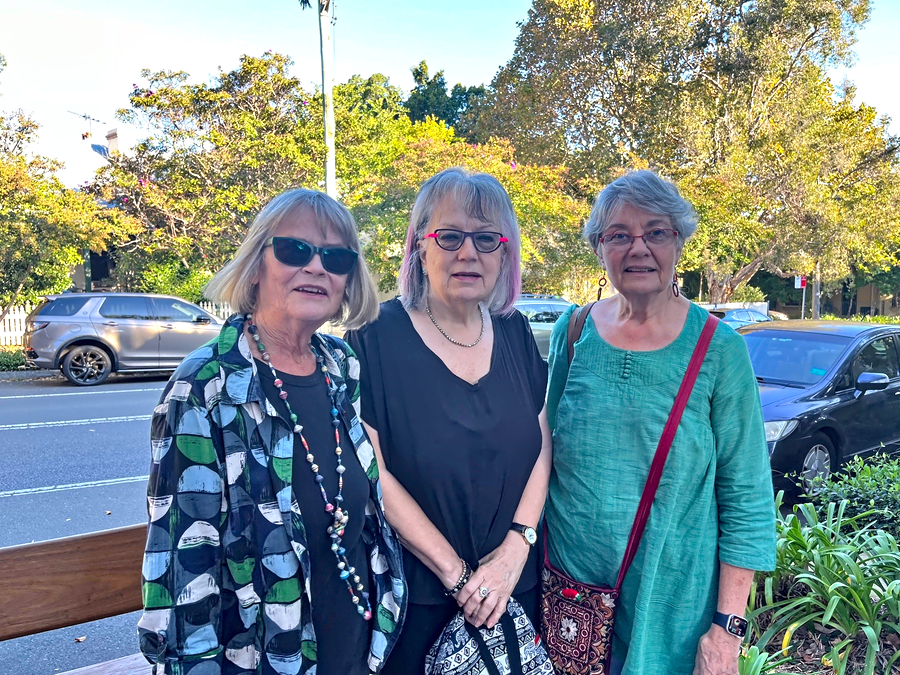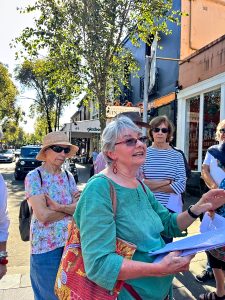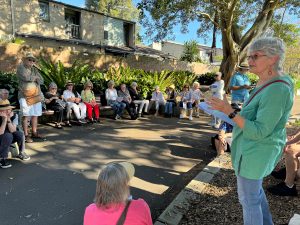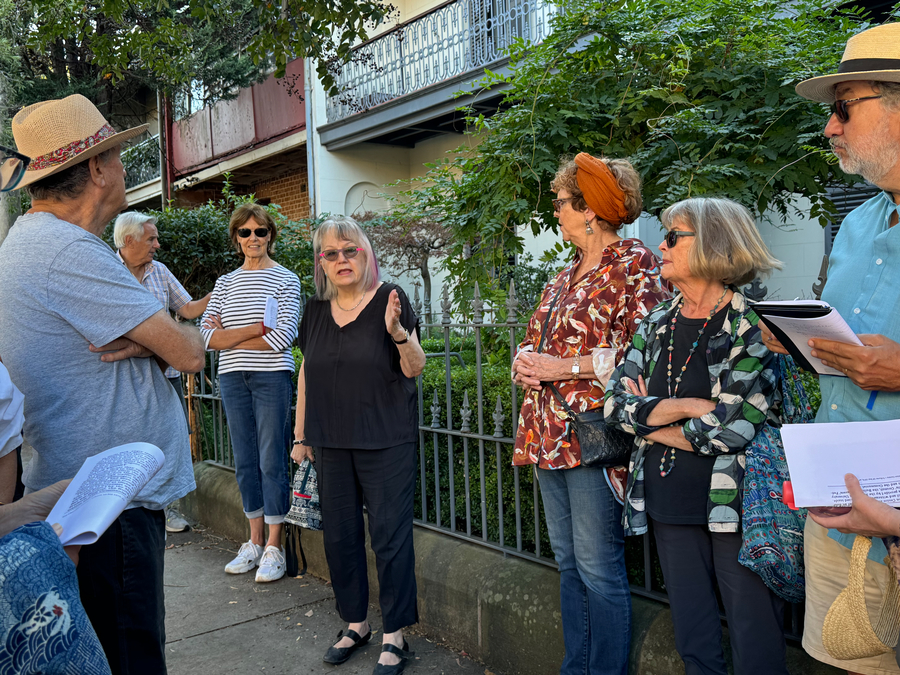By David Rushton and Helena Klijn, Bulletin 3/2024, May

Back by popular demand, a repeat of the ‘Radical Glebe’ walk led by Meredith Burgmann, Helen Randerson and Heather Goodall was held on Sunday 14 April. All three of these storied guides are distinguished not only by the breadth of their political and social activism, but by the longevity of their involvement, spanning many decades. Equally remarkable is how much of this activism originated in Glebe.
Thirty-three enthusiastic walkers gathered at 2 pm outside Gleebooks, a long-standing ally and supporter of many of these social justice activist groups.
Helen began by outlining the story of No. 33a Glebe Point Road, the site of Sydney’s first gay and lesbian organisation, CAMP Inc., which from 1973 to 1981, offered a telephone counselling service, a newsletter and more, in support of the gay and lesbian community.
We moved on to 67 Glebe Point Road which has had many guises, being home from 1967 to successively: the Sydney University Labor Club; the Communist Party; from 1970 to 1972, Women’s Lib House with its reading and meeting room; and from 1972 to 1974, home to Gay Lib – that time including a Gay Pride week in 1973 featuring exciting bus rides and police arrests.

Heather then discussed the history of Gleebooks and its start in 1975 at 191 Glebe Point Road (it moved to the present location in 1990). It was a great source of radical books, and the centre of many copyright and censorship issues, and hosted Salman Rushdie’s first public appearance after coming out of protection.
Meredith then told us about 128 Glebe Point Road – Australia’s first halfway house (around 1977) and its involvement with the NSW Prisoners’ Action Group; prisoners and notable characters included Ray Denning and Darcy Dugan (who opened the house with bolt cutters!).
Helen then discussed 130 Glebe Point Road, home of the Sydney Anarchists from 1975 to 1976. They had their first conference at The Abbey on Bridge Road, which Meredith noted was very well organised for anarchists! Among its activities was the Dairy Liberation Front, redistributing milk from the eastern suburbs, and the anti-apartheid movement.

On that issue, Meredith gave a run-down on the squatters in Darghan Street in the early 1970s and their actions to defeat the Springbok tour (featuring ships’ chandlers’ flares) whilst fending off the Nazis in the same street.
We enjoyed a shady break in Foley Park while Heather told us about the Aboriginal Dance company which started in Redfern in 1972 following the visit of African American woman Carole Johnson, and which moved to Glebe in 1975. We were also given a history of Tranby College, an Indigenous Cooperative College originally run by the Anglican Board of Missions and the unions, key figures being Rev. Alf Clint and Kevin Cook. Tranby College was instrumental in promoting the cooperative model and nurturing key figures in First Nations activism. Tranby has been active in many important campaigns including the 1967 referendum, the Black Deaths in Custody Royal Commission, protests about Pine Gap, and the campaign for a Nuclear-Free Pacific.
We walked down St Johns Road where, at Westmoreland Street, Heather told us of Elsie Women’s Refuge, set up in 1974 by Anne Summers, Bessie Guthrie and others. It was the first of its kind in Australia, providing a refuge where, importantly, women (and their children) could stay the night and beyond. Brave volunteers were stationed protectively at the doors at night, quite a frightening experience. Elsie was the model for other such shelters set up later elsewhere in NSW such as at Bourke.
Helen then told us of 149 St Johns Road, site of the NSW Council for Civil Liberties, set up after a 1963 police raid of a gay party in Kings Cross. The Council was involved with notable censorship matters – ‘Lady Chatterley’s Lover’ and ’Oh Calcutta!’ – and issues such as police misconduct, child welfare, Indigenous activism, and anti-Vietnam protests.
We passed the grand Glebe Town Hall where Meredith spoke of some of the colourful characters who had presided there, including Mayor Foley and his infamous steamroller, and told us that it had been the location of the first lesbian dances – featuring, in 1973, the inevitable police raid.
Informed, energised and entertained, we adjourned for a welcome drink at the Forest Lodge Hotel – well-known to our intrepid guides in past days as an anti-Vietnam and anti-conscription hub.









There are no comments yet. Please leave yours.